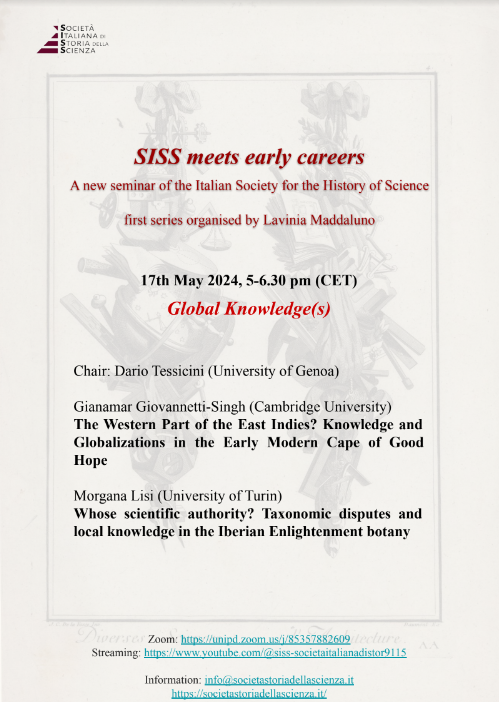The Italian Society for the History of Science / Società Italiana di Storia della Scienza (SISS) is pleased to announce a new Seminar Series:
SISS Meets Early Careers
The series is conceived as an informal place for early career scholars to discuss their research, present, future and past. Each session focuses on broad themes in the history of science and knowledge, bringing together diverse approaches, methodologies and chronologies. The series is open to international scholars and broad collaboration between disciplinary fields.
All seminars are held online on Zoom: https://unipd.zoom.us/j/85357882609
Streaming: //www.youtube.com/@siss-societaitalianadistor9115>">https://www.youtube.com/@siss-societaitalianadistor9115
Information:
Organizer of the first series: Dr Lavinia Maddaluno (Ca’ Foscari University of Venice).
Chair: Dario Tessicini (University of Genova)
Gianamar Giovannetti-Singh (Cambridge University), The Western Part of the East Indies? Knowledge and Globalizations in the Early Modern Cape of Good Hope
Morgana Lisi (University of Turin), Whose scientific authority? Taxonomic disputes and local knowledge in the Iberian Enlightenment botany
Abstracts and bios
Gianamar Giovannetti-Singh (Cambridge University), The Western Part of the East Indies? Knowledge and Globalizations in the Early Modern Cape of Good Hope
Where does southern Africa fit within global histories of the sciences? Between the late fifteenth and late nineteenth centuries, almost every traveller sailing between Asia and Europe spent time at the Cape of Good Hope. Often described as the "Tavern of the Two Seas," the early modern Cape was a bustling hub of disparate, interacting cultures of knowledge. Indigenous Khoekhoen populations, European travellers, Dutch settlers, and enslaved East Africans, South Asians, and Southeast Asians brought diverse cosmologies to the southern tip of Africa, producing new, hybridised understandings of natures and humans. In May 1685, an embassy of French Jesuits destined for Siam and China disembarked at the Cape, where they built a temporary astronomical observatory in the Dutch East India Company's Garden. The travelling missionaries documented their interactions with the Khoekhoen, translating southern African conceptions of the heavens and local plants and animals for European readers. The French Jesuits, familiar with Chinese cultures of knowledge from their fellow missionaries, made sense of unfamiliar African knowledges through the lens of Asian sciences. By examining the recrafting of Asian knowledges at the Cape Colony, this paper explores southern Africa's crucial importance in the early modern globalisation of several natural knowledges. It seeks both to cement southern Africa's crucially important place in the history of the early modern sciences and explore the ways in which "nature" has been deployed to write out southern African knowledges from global histories of science.
Bio: Gianamar Giovannetti-Singh is the Lumley Research Fellow in History at Magdalene College and a Leverhulme Trust Early Career Fellow in the Faculty of History at the University of Cambridge. His PhD, "Globalising China," completed in 2023 in the Department of History and Philosophy of Science at Cambridge, examined how the Manchu conquest of China transformed politics and the sciences across early modern Eurasia. Gianamar's work has been published and is forthcoming in journals including Isis, History Workshop Journal, the Journal of the History of Ideas, and the Journal for the History of Knowledge. Gianamar has been a Freer Prize Fellow of the Royal Institution, and a visiting fellow at the Max Planck Institute for the History of Science in Berlin and the Descartes Centre in Utrecht.
Morgana Lisi (University of Turin), Whose scientific authority? Taxonomic disputes and local knowledge in the Iberian Enlightenment botany
The late eighteenth-century Bourbon scientific policies were mainly aimed at exploring the territories of the Spanish monarchy to define an avant-garde mapping of the profitable resources that could have been commercialised in medicinal, goods, and luxury markets. Financed by the Crown, the young botanists Hipólito Ruiz and José Pavón explored the nature of the Viceroyalty of Peru and Chile between 1777 and 1788, observing, naming, collecting, and cataloguing endemic species according to the Linnean system of classification. The majority of the specimens collected during the expedition are now preserved at the Herbarium (MA) of the Royal Botanical Garden of Madrid. However, some of the plants determined by Ruiz and Pavón had already been described by Creole naturalists who previously studied the same territory. By analysing the cases of quillay (Quillaja saponaria Molina) and araucaria (Araucaria araucana (Molina) K.Koch), this contribution tries to shed light on – a part of – the epistemic implications of the scientific expeditions and on the production of knowledge that arose from the disputes ensued by the clashes of different scientific authorities that studied the same subject simultaneously. The aim is to enrich contemporary historiography with ideas and actors marginally considered by the traditional narrative. Indeed, these actors have also participated in constructing Enlightenment botany, creating an Atlantic dialogue between the local and the global dimensions by conveying natural knowledge of distant geographies into the European cultural horizons.
Bio: Morgana Lisi is a PhD Candidate in Global History of Empires at the University of Turin, Italy. Her research interests include cultural history, the history of science, and the history of knowledge in the early modern Iberian world. She authored various essays on Juan Ignacio Molina's thinking and scientific contribution, and she is currently exploring the process of epistemological transformation of Natural History in the eighteenth-century Spanish monarchy, focusing on the studies by Creole naturalists in the province of Chile.


